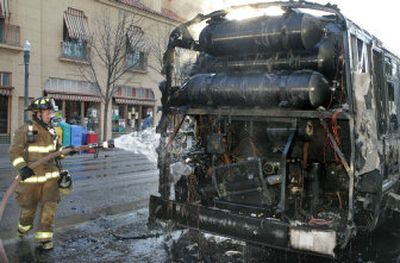Natural gas bus explodes at stop

BOISE – A natural gas-powered city bus burst into flames at a busy downtown bus stop Thursday morning.
No one was injured, but the bus was a total loss.
The fire began at about 8:15 a.m., when the bus driver was on a break, Boise Fire Department Capt. Tom Pawek said. Another bus driver spotted the flames and called emergency dispatchers. But by the time police arrived less than a minute later, the rear of the bus was totally engulfed.
Pawek said a venting system built into the engine prevented a large natural gas explosion. Still, flames shot nearly three stories into the air.
The cause of the fire was not immediately known. Witnesses heard a whooshing and popping sound as the flames began, but Pawek said that could have been the safety venting system.
Similar natural gas bus fires are not uncommon in Boise, said Deputy Fire Chief Dave Hanneman.
“This is the fourth or fifth bus that I’ve seen catch fire in the past four or five years,” Hanneman said. “The natural gas fuels the fire, and that’s that.”
The fires can spread very quickly, he said.
“It’s hard to say how fast it’s going to spread, but in this case it was only about a minute, so it’s good that the bus was empty,” Hanneman said. “That’s why they have to get people off very quickly – that’s why we have emergency exits.”
Mark Carnopis, spokesman for Valley Regional Transit, said the bus company has lost three buses to fires in the last decade. However, he said, there may have been smaller bus fires that required repairs during that time.
“I would contend that one a year, that’s not anywhere near reality,” Carnopis said. “We may have some malfunctions or minor fires if a hose breaks, but the last really bad fire in terms of making a bus inoperable was in 1996 and again last October.”
The bus that burned on Thursday was built in 1995. Such buses are generally expected to last between 10 and 12 years, so the bus was at the end of its usable span, Carnopis said. A replacement bus would cost anywhere between $325,000 and $350,000, he said.
“We are self-insured, so if there is a problem like this one that’s not caused by a driver, we just eat the cost,” Carnopis said.
Compressed natural gas engines have been used for public transit for more than 25 years, he said.
“We don’t want a gloom and doom scenario – these are very safe buses. We certainly wouldn’t put a bus on the streets that saved money but wasn’t a safe bus,” he said.
The buses have a thick firewall between the engine compartment and passenger compartment, and the compressed natural gas vents upward instead of spilling along the ground, as methane and other fuels do, Carnopis said.